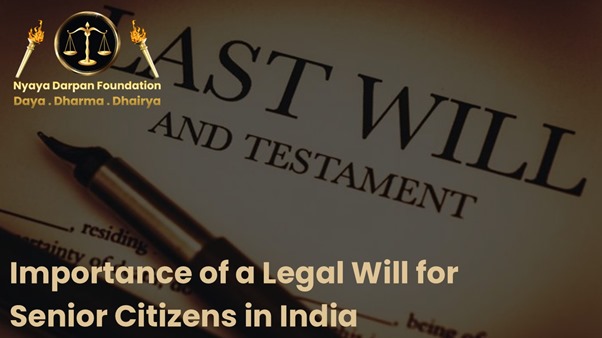Why You Need a Will — Before It’s Too Late
As a senior citizen, you’ve spent a lifetime building your legacy — your home, your savings, your family. But what happens after you’re gone? Without a legally valid will, your hard-earned assets could fall into the wrong hands, triggering years of family disputes, legal battles, and emotional distress.
Sadly, many Indian families fall apart after the passing of a parent — not because of grief, but because of confusion, conflict, or greed over inheritance.
That’s why writing a will is not just a legal necessity — it’s a gift of clarity, peace, and protection to your loved ones.
What Is a Will and Why Does It Matter?
That’s why writing a will is not just a legal necessity — it’s a gift of clarity, peace, and protection to your loved ones.
- Who inherits your property, money, and valuables
- Who will act as executor (to carry out your wishes)
- Specific instructions for care of dependents, pets, or charitable donations
- Protection for the vulnerable — such as mentally or physically disabled children
Without a will, your assets are distributed as per the laws of intestate succession, which may not reflect your wishes — especially in blended families, estranged relationships, or joint properties.
What Happens If You Die Without a Will?
Dying intestate (without a will) means:
- Your spouse, children, siblings, and relatives may all have competing claims
- Courts may appoint an administrator — someone you didn’t choose
- Vulnerable or dependent family members may get left out
- Property can be frozen for years in probate or civil litigation
- Emotional bonds may break due to bitterness over assets
Top Benefits of Creating a Legal Will
Avoid Family Disputes :Clearly divide your estate to prevent misunderstandings and court cases.
Protect the Vulnerable : Allocate funds or property for disabled or dependent family members.
Express Final Wishes : Appoint an executor, specify burial wishes, or leave behind charitable gifts.
Peace of Mind : Know that your legacy will be honored exactly as you intended.
How to Make a Legal Will in India
Making a valid will is simple, yet must follow legal requirements. Here’s a quick checklist:
- It must be in writing (handwritten or typed)
- You must be of sound mind and free of coercion
- It should mention the date, beneficiaries, assets, and executor
- It must be signed in the presence of two independent witnesses
- Registration of the will is optional but highly recommended
Why You Shouldn’t Use DIY Will Templates
While it may be tempting to write a will at home, generic formats may not hold up in court. A lawyer helps you:
- Avoid vague language or loopholes
- Ensure compliance with Indian succession laws
- Protect against future disputes or challenges by relatives
- Draft special provisions (for blended families, adopted children, or charities)
- Clearly mention movable and immovable assets with jurisdictional clarity
Let Nyaya Darpan Foundation Help You Draft Your Will with Care
At Nyaya Darpan Foundation, we understand the emotional and legal importance of writing your will. Our legal experts will:
- Offer pro bono advisory to understand your situation and intent
- Help you draft a legally sound will that reflects your values and protects your family
- Ensure that your will aligns with succession laws, clarity of language, and enforceability
At Nyaya Darpan Foundation, we understand the emotional and legal importance of writing your will. Our legal experts will:
Call to Action: Take Control of Your Legacy Today
You’ve lived with strength and dignity. Don’t let your life’s work fall into uncertainty.
Let Nyaya Darpan Foundation help you secure your legacy, protect your loved ones, and ensure peace beyond your lifetime.
📞 Reach out today for a free consultation
📍 Let us help you draft your will with clarity, care, and legal precision.
Footnote
At Nyaya Darpan Foundation, Consultation and Legal Advisory services are offered pro bono — because we believe that awareness and access to justice should never come at a cost.
If you require legal representation in court, a case fee may apply based on the complexity of the matter and the effort involved.
However, if you are an individual below the poverty line and are referred by the Legal Services Committee at the High Court, our lawyers will assist you:
- Pro Bono (Completely Free of Cost)
- Low Bono (Minimal Cost) — covering only essential commute, appearance, and court clerical expenses.
Justice is your right — not a privilege. We’re here to help you claim it…!
